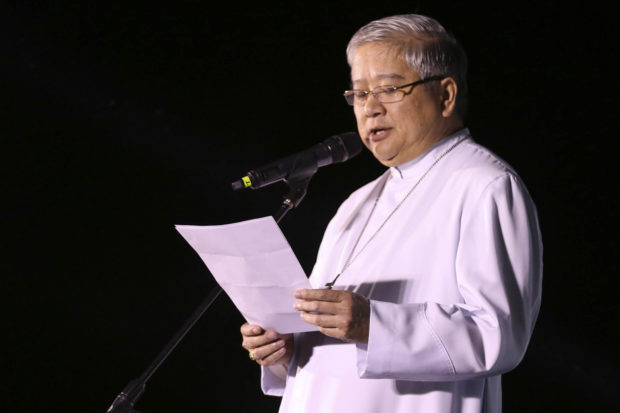
Catholic Bishops Conference of the Philippines president and Lingayen-Dagupan Archbishop Socrates Villegas–INQUIRER PHOTO / NINO JESUS ORBETA
Police officers who want to divulge their participation in summary executions in President Rodrigo Duterte’s war on drugs have sought protection from the Catholic Church, the president of the Catholic Bishops’ Conference of the Philippines (CBCP) said on Monday.
In a statement titled “To be angels of compassion,” Lingayen-Dagupan Archbishop Socrates Villegas, the CBCP president, said the police officers, troubled by their conscience, had approached the Church and offered to speak about their roles in the killings but asked for sanctuary.
“[They] have come forward confidentially to us their spiritual leaders to seek sanctuary, succor and protection. They have expressed their desire to come out in the open about their participation in extrajudicial killings and summary executions. Their consciences are troubling them,” Villegas said.
It was the first time that a Church official had disclosed requests for Church assistance by police officers in testifying about summary executions in the war on drugs.
Thousands killed
More than 3,800 people have been killed by police in drug raids since Mr. Duterte launched his war on drugs after taking office in June last year.
Thousands of others have been killed by unknown assailants who, police say, could be killers hired by drug gangs trying to eliminate each other but who rights groups say could be working with the authorities.
The killings have drawn expressions of concern from the United States, European Union and United Nations, and international rights groups have urged an independent investigation into the slayings.
The Duterte administration has accused the Western governments of interfering in the Philippines’ domestic affairs but has said it is open to an investigation, although Malacañang has set conditions for allowing a UN probe, including a public debate between the UN special rapporteur for summary executions and extrajudicial killings Agnes Callamard and President Duterte.
Last week, 39 countries attending the United Nations General Assembly in New York—including the United States, Canada and Australia—issued a joint statement urging the Philippines to stop the killings and allow an investigation by Callamard without conditions.
Malacañang said the government would be happy to accept foreign assistance in the fight against drugs, but would never allow other countries to dictate how to handle the country’s internal affairs.
Church to help witnesses
Villegas, a critic of Mr. Duterte’s war on drugs, said the Church was willing to help policemen seeking protection.
He said the Church was willing to grant the policemen and their families accommodation, shelter and protection “within the bounds of Church and civil laws.”
The Church, however, will “look prudently into the sincerity of their motives and the veracity of their stories,” Villegas said.
“The hospitality, comfort and acceptance that they seek from the Church will be attended to. Whatever we do to the least of our brethren we do to Christ,” he said.
Villegas gave assurance that the Church would see to it that the policemen would “not be induced to speak, disclose or make allegations” if they wanted to testify.
He stressed that statements such as affidavits and depositions must be made with the assistance of competent independent counsel.
“If their preference is to stay with us in the Church, they will not be turned over to the State under its own witness protection program,” he added.
Villegas urged priests in the Archdiocese of Lingayen-Dagupan to open their rectories, convents, seminaries and other secure places to policemen seeking sanctuary.
“My brothers priests in Lingayen-Dagupan are requested, in the name of the Lord … to be responsible for the security of the gallant men and women in uniform who may have something important to tell the nation or to testify before the proper forum,” he said.
He reminded priests not to discuss with anyone the testimonies and depositions of the “asylum seekers.”
Villegas urged volunteer lawyers and alternative law groups to assist the witnesses so that clergy may not be accused of influencing their testimonies.
“But when they so decide or opt to identify themselves and to testify, every means must be provided for a fair, accurate and unconstrained or unrestrained testimony that may be used in evidence,” he said.
Villegas said his archdiocese would also offer pastoral counseling and values formation to policemen “who need the hospitality of the Church.”
“The Archdiocese of Lingayen-Dagupan will be the loving teacher and mother of our law enforcers. Let us be guardian angels for one another,” he said.
‘War on drugs immoral’
At a hearing in the Senate on Monday on the killing of minors by police, Catholic priest Robert Reyes said the clergy would not take part in police drug operations because the war on drugs was “immoral.”
“We are not joining [the operations]. Our conscience dictates that [joining] legitimizes an operation that from the beginning we already decided is immoral,” Reyes told the hearing called by the committee on public order and dangerous drugs.
“We have decided the war on drugs is immoral. You do not solve a health issue with police force,” he added.